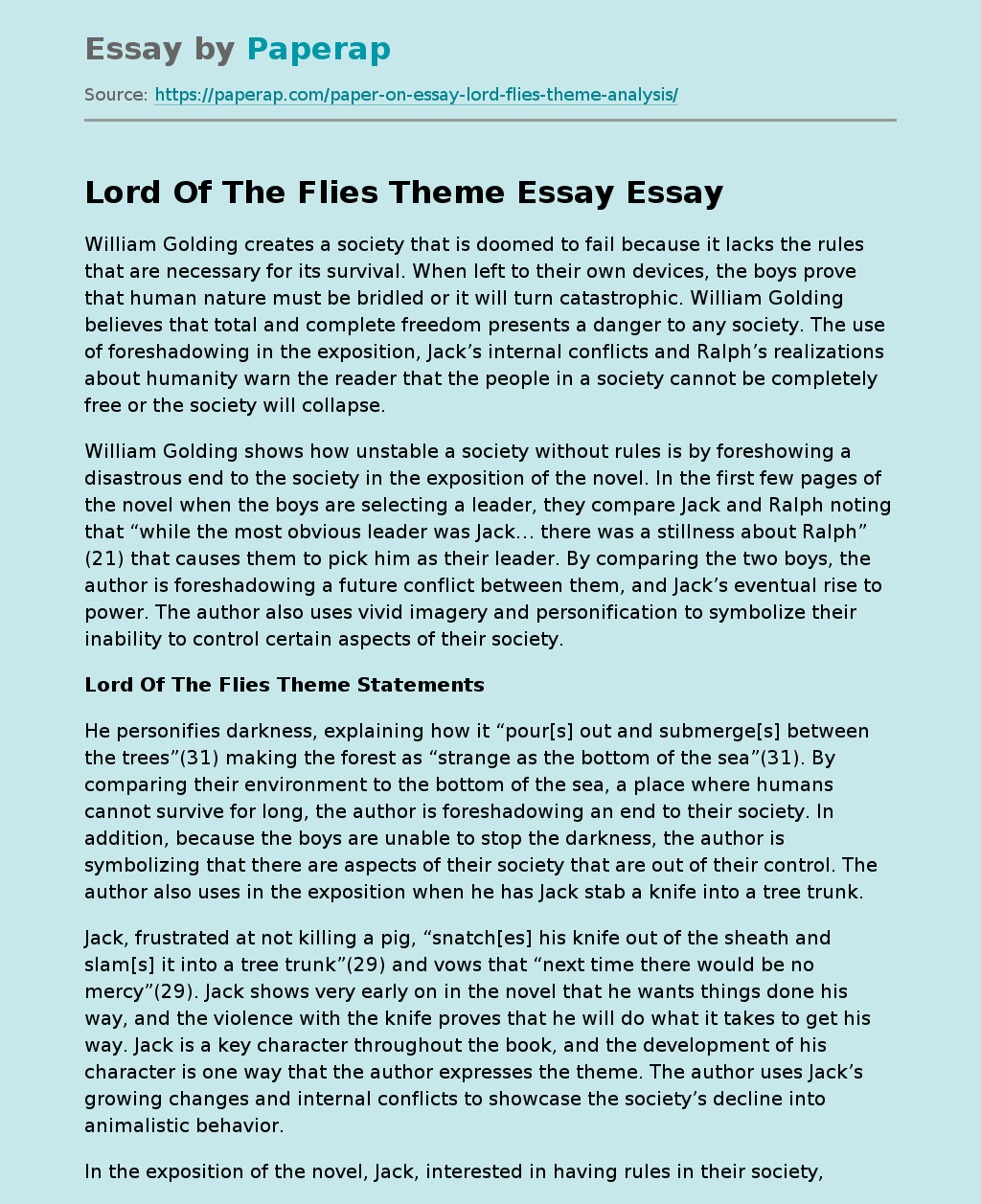Lord Of The Flies Theme Essay
William Golding creates a society that is doomed to fail because it lacks the rules that are necessary for its survival. When left to their own devices, the boys prove that human nature must be bridled or it will turn catastrophic. William Golding believes that total and complete freedom presents a danger to any society. The use of foreshadowing in the exposition, Jack’s internal conflicts and Ralph’s realizations about humanity warn the reader that the people in a society cannot be completely free or the society will collapse.
William Golding shows how unstable a society without rules is by foreshowing a disastrous end to the society in the exposition of the novel. In the first few pages of the novel when the boys are selecting a leader, they compare Jack and Ralph noting that “while the most obvious leader was Jack… there was a stillness about Ralph” that causes them to pick him as their leader. By comparing the two boys, the author is foreshadowing a future conflict between them, and Jack’s eventual rise to power.
The author also uses vivid imagery and personification to symbolize their inability to control certain aspects of their society.
He personifies darkness, explaining how it “pour[s] out and submerge[s] between the trees” making the forest as “strange as the bottom of the sea”. By comparing their environment to the bottom of the sea, a place where humans cannot survive for long, the author is foreshadowing an end to their society.
In addition, because the boys are unable to stop the darkness, the author is symbolizing that there are aspects of their society that are out of their control. The author also uses in the exposition when he has Jack stab a knife into a tree trunk.
Jack, frustrated at not killing a pig, “snatch[es] his knife out of the sheath and slam[s] it into a tree trunk” and vows that “next time there would be no mercy”. Jack shows very early on in the novel that he wants things done his way, and the violence with the knife proves that he will do what it takes to get his way. Jack is a key character throughout the book, and the development of his character is one way that the author expresses the theme. The author uses Jack’s growing changes and internal conflicts to showcase the society’s decline into animalistic behavior.
In the exposition of the novel, Jack, interested in having rules in their society, “cry[s] excitedly… “We’ll have rules! Lots of rules! Then when anyone breaks ‘em-“. The author shows that Jack wants to be in charge, and that he originally wants for there to be rules, so that they can escape the island. After living without adults for a while, however, Jack stops worrying about being rescued. In fact, when Ralph mentions being rescued “Jack ha[s] to think for a moment before he [can] remember what rescue [is]” and he goes back to talking about how he wants to kill a pig.
Jack knows that killing the pig will give him a feeling of power that he craves desperately, and it makes him even more inhuman. Jack eventually leads some of the boys away from Ralph and separates himself further by painting his face, and demanding that he be named their Chief. When one of the boys asks him a question, “The Chief’s blush [is] hidden by the white and red clay”(147). By using the clay to hide his face, Jack is making himself invulnerable and inaccessible, setting himself apart from the others. The last way that the author proves the theme is with Ralph’s realizations about humanity.
Golding uses Ralph’s thoughts and opinions towards the end of the book to show the meaning of the novel. When Ralph looks at himself and the other boys and sees how dirty they are, and how little that affects him, he realizes “with a little fall of the heart that these were the conditions he took as normal now and that he did not mind”(100). The fact that he no longer cares that the boys are changing shows that he knows that he cannot control it. Another example would be that after helping to kill Simon, Ralph does not deny what he did, but instead says “I wasn’t scared, I was- I don’t know that I was”.
Ralph acknowledges that he and the others boys are changing to the point where they don’t even recognize themselves anymore. Lastly, Ralph, hunted by the other boys, “feel[s] the point of his spear with his thumb… grin[ing] without amusement”. Ralph doesn’t want to hurt the boys, but he knows that he will do what he has to in order to protect himself. He went from being the one who wanted order in their society to someone who has to hide for his own safety. Golding develops the theme that total and complete freedom presents a danger to a society throughout the whole novel.
He used foreshadowing in the exposition to show that the society would fail. He also showed Jack’s fall from grace to symbolize the society was a whole changing. Lastly, he used Ralph to express his views on humanity. Golding used this novel as a warning to future generations- that too much freedom can, in fact, be bad. He believes that it is human nature to want to be on top, and that humans will do what is necessary to get there. Golding sees rules as the one thing that protects humans from their own savagery. Works Cited Golding, William. Lord of the Flies. United States of America: Putnam, 1954.
Lord Of The Flies Theme Essay. (2019, Dec 05). Retrieved from https://paperap.com/paper-on-essay-lord-flies-theme-analysis/

